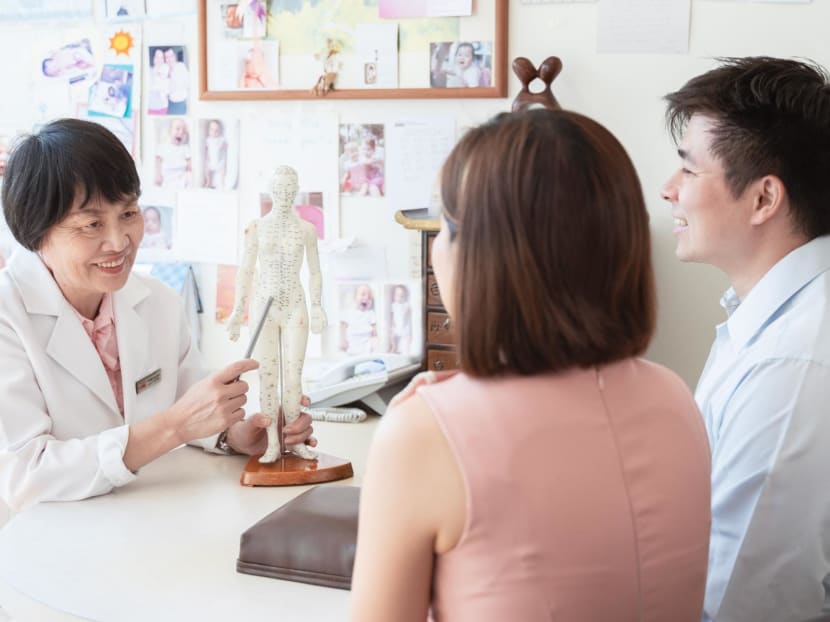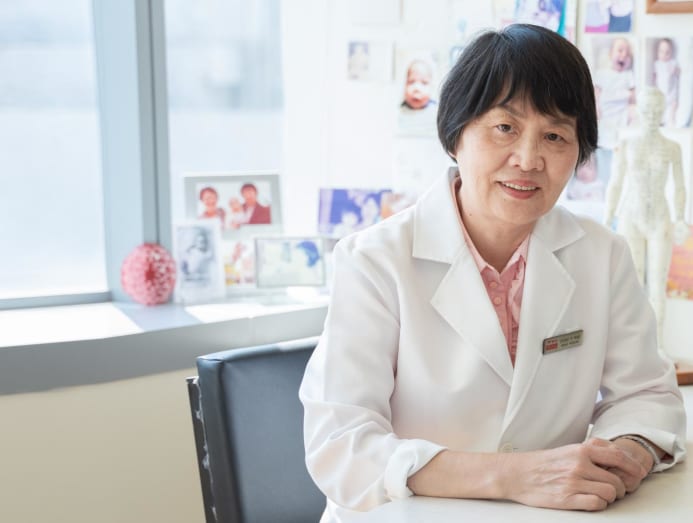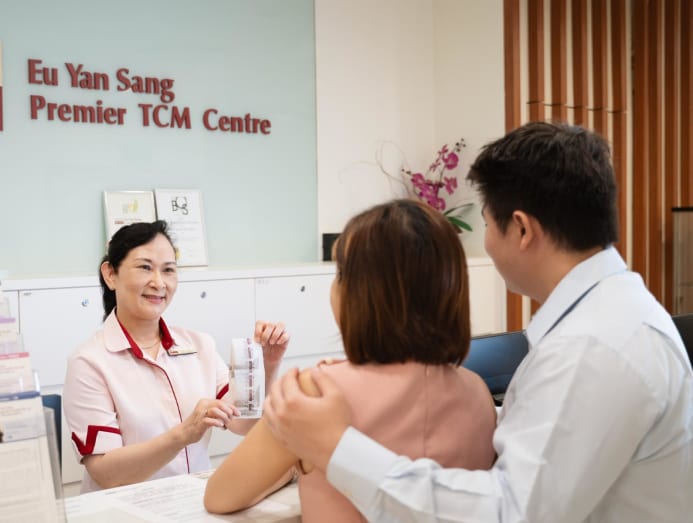Understanding fertility issues through the lens of traditional Chinese medicine
TCM prepares the body for conception by addressing imbalances, thus establishing optimal conditions, says a senior physician from Eu Yan Sang Premier TCM Centre.

For fertility enhancement, senior physician Zhong Xi Ming from Eu Yan Sang Premier TCM Centre at Paragon highlights the importance of improving body conditions for increased success. Photos: Eu Yan Sang

This audio is generated by an AI tool.
For couples looking to welcome a new addition in the auspicious Year of the Dragon, there is still time to initiate the journey. However, what if natural conception proves to be a challenge?
Alongside conventional fertility methods, exploring traditional Chinese medicine (TCM) pathways could boost your chances of conceiving.
According to senior physician Zhong Xi Ming, who practises at Eu Yan Sang Premier TCM Centre at Paragon, the success of conception hinges on several factors, including the fertility health of both partners and the timing of intercourse. Drawing from more than 25 years of clinical practice, she shared that approximately one third of her patients grapple with fertility issues, with some concurrently leveraging artificial reproductive methods such as in-vitro fertilisation (IVF) treatment.
CULTIVATING AN OPTIMAL ENVIRONMENT
Several common female fertility concerns, such as uterine fibroids, polycystic ovary syndrome, endometriosis, blockage of the fallopian tubes, ovarian cysts and uterine polyps, can hinder the process of conception, said Ms Zhong. Meanwhile, men may contend with conditions such as erectile dysfunction, premature ejaculation, as well as low sperm quality and quantity.
When it comes to enhancing fertility, Ms Zhong highlighted that the overarching principle of TCM is to “cultivate the soil before planting the seed” – this refers to optimising conditions in the body for the best chances of success.
“In TCM, we take a holistic perspective and consider the patient as a whole, addressing not only the immediate fertility concern but also other aspects contributing to the body’s overall balance,” she explained.
For instance, high stress levels could be a factor preventing some mothers from conceiving, she said. “Beyond prescribing herbs to enhance uterine health, we incorporate herbs known for their stress-relieving properties,” said Ms Zhong.
Prior to formulating a tailored treatment plan, the physician conducts a thorough assessment to determine the patient’s constitution. It is crucial to recognise that there is no one-size-fits-all prescription for fertility issues, considering the unique characteristics and circumstances of each individual.
“The treatment objective is to identify and rectify imbalances within the body. We aim to achieve this by supplementing deficiencies and eliminating excesses,” shared Ms Zhong. “Herbs are also selected based on the patient’s menstrual cycle. If she’s approaching the ovulation phase, we will prescribe herbs that stimulate ovulation and ‘warm’ the uterus, so conditions are optimal for conception to occur.”
Some examples of traditional Chinese herbs used to stimulate ovulation include chuan xiong (rhizoma chuanxiong) and dang gui (radix angelicae sinensis), while du zhong (cortex eucommiae) and tu si zi (semen cuscutae) may be prescribed to maintain optimal uterine health for implantation, she elaborated.
In addition to utilising Chinese herbs, acupuncture is another common TCM method for addressing fertility issues. Alongside treatment sessions, patients receive guidance on improving their dietary habits and lifestyle to foster overall wellness.
WORKING IN TANDEM WITH WESTERN MEDICINE

In her practice, Ms Zhong attends to four to five patients undergoing IVF monthly. She highlights the complementary synergy between TCM and Western medicine, underscoring the important role the latter plays in facilitating conception. For instance, factors such as hormone levels and sperm quality – crucial determinants for successful fertilisation – can only be accurately monitored through laboratory testing.
“We consistently advocate for open communication between patients and their gynaecologists regarding concurrent TCM treatment, as studies indicate that combining TCM with Western medicine enhances the likelihood of successful conception,” Ms Zhong said, adding that three in four of her IVF patients achieve successful pregnancy.
She shared that research has demonstrated the benefits of combining TCM with assisted reproductive techniques such as IVF and intracytoplasmic sperm injection (ICSI).
In a 2015 study conducted by the Oregon College of Oriental Medicine, Oregon Health and Science University and the Northwest Center for Reproductive Sciences in Washington, patients who complemented their IVF treatments with whole-systems TCM had more live births (around 61 per cent) than those who received standard IVF care (around 48 per cent). The whole-systems TCM approach encompasses acupuncture, Chinese herbal medicine as well as dietary and lifestyle recommendations.
In a German study published in the journal Fertility and Sterility in 2006, acupuncture administered at the luteal phase (the second part of the menstrual cycle) had a positive effect on the outcome of IVF and ICSI. Among the participants who received acupuncture, the clinical pregnancy rate stood at 33.6 per cent, while the control group registered a rate of 15.6 per cent.
WHO IS TCM FOR?

According to Ms Zhong, TCM treatment is suitable for all patients, with a few essential considerations to bear in mind. Individuals on Western medication for chronic conditions such as high blood pressure and diabetes should continue taking their medication alongside their TCM prescription. However, it is recommended to space them out by at least two hours, she advised.
Moreover, patients should share their medical history and current medications with both their TCM practitioner and Western doctor. “This ensures awareness of potential drug interactions,” said Ms Zhong. For instance, individuals with G6PD deficiency should avoid specific Chinese herbs like huang lian (rhizoma coptidis) as it may exacerbate the condition, she said.
Beyond addressing ailments, TCM is known for its preventive care approach. “An experienced physician works to address the disease before it presents itself. We do this by prescribing herbs that help balance the individual’s constitution and ensure the organs are functioning at optimal levels,” shared Ms Zhong.
Eu Yan Sang Premier TCM Centres at Paragon and The Woodleigh Mall are one-stop centres for women’s and children’s health. Learn more about TCM treatments at Eu Yan Sang.






